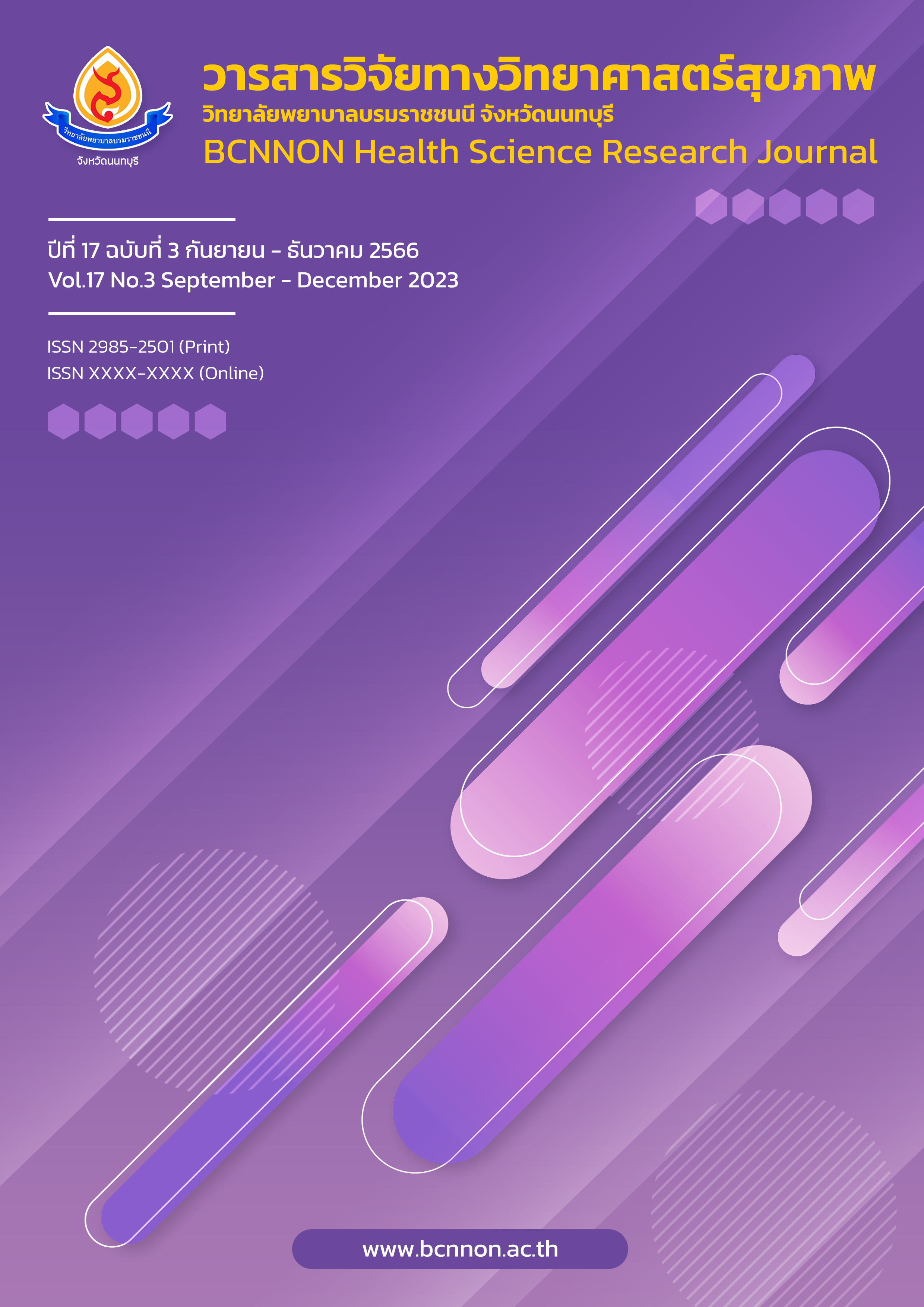การพัฒนารูปแบบการสร้างสุขภาวะตามปรัชญาเศรษฐกิจพอเพียง ในกลุ่มเครือข่ายเกษตรกรโคกหนองนาโมเดล
Main Article Content
บทคัดย่อ
บทนำ : การพัฒนาเกษตรกรให้มีสุขภาวะที่ดีตามหลักปรัชญาเศรษฐกิจพอเพียงจะช่วยให้พึ่งพาตนเองและมีคุณภาพชีวิตที่ดี
วัตถุประสงค์การวิจัย: เพื่อพัฒนารูปแบบการสร้างสุขภาวะของเกษตรกร ในกลุ่มเครือข่ายเกษตรกร
โคกหนองนาโมเดล อำเภอมัญจาคีรี จังหวัดขอนแก่น
วิธีการวิจัย : การวิจัยเชิงปฏิบัติการแบบมีส่วนร่วม ตัวอย่างที่ใช้สำรวจข้อมูลสถานการณ์สุขภาวะ จำนวน 224 คน กลุ่มผู้ร่วมพัฒนารูปแบบ จำนวน 30 คน และตัวอย่างที่เป็นสมาชิกกลุ่มเครือข่ายเกษตรกรที่เข้าร่วมกิจกรรมสร้างสุขภาวะพื้นที่ต้นแบบ จำนวน 35 คน เครื่องมือวิจัย ได้แก่ แบบสอบถามพฤติกรรมการสร้างสุขภาวะ แบบวัดคุณภาพชีวิต แบบวัดความสุข และแบบประเมินการมีส่วนร่วมและความพึงพอใจต่อการพัฒนารูปแบบ แนวคำถามการสนทนากลุ่มและสัมภาษณ์เชิงลึก วิเคราะห์ข้อมูลด้วยสถิติพรรณาและ Paired sample t-test และการวิเคราะห์เชิงเนื้อหา
ผลการวิจัย : รูปแบบประกอบด้วย 1) การสร้างเครือข่าย 2) การมีส่วนร่วมของชุมชนและภาคีเครือข่าย
3) การพัฒนาศักยภาพเกษตรกรในการสร้างเสริมสุขภาพ 4) การช่วยเหลือกัน แบ่งปันและเยี่ยมบ้าน
5) ร่วมอนุรักษ์ธรรมชาติและดูแลสิ่งแวดล้อม 6) การกระตุ้น เสริมแรง ติดตาม ประเมินผล และพบว่า คะแนนเฉลี่ยของพฤติกรรมการสร้างสุขภาวะ คุณภาพชีวิต ความสุข การมีส่วนร่วมและความพึงพอใจในการพัฒนารูปแบบเพิ่มขึ้นอย่างมีนัยสำคัญทางสถิติ (p<.001) ค่าเฉลี่ยดัชนีมวลกายลดลงอย่างมีนัยสำคัญทางสถิติ (p<.001)
สรุป : รูปแบบการสร้างสุขภาวะตามปรัชญาเศรษฐกิจพอเพียงทำให้มีพฤติกรรมสุขภาวะที่ดี เพิ่มคุณภาพชีวิตและความสุขให้กับเครือข่ายเกษตรกรโคกหนองนา
Downloads
Article Details

อนุญาตภายใต้เงื่อนไข Creative Commons Attribution-NonCommercial-NoDerivatives 4.0 International License.
บทความที่ได้รับการตีพิมพ์เป็นลิขสิทธิ์ของวิทยาลัยพยาบาลบรมราชชนนี จังหวัดนนทบุรี
ข้อความที่ปรากฏในบทความแต่ละเรื่องในวารสารวิชาการเล่มนี้เป็นความคิดเห็นส่วนตัวของผู้เขียนแต่ละท่านไม่เกี่ยวข้องกับวิทยาลัยพยาบาลบรมราชชนนี จังหวัดนนทบุรี และคณาจารย์ท่านอื่น ในวิทยาลัยฯ แต่อย่างใด ความรับผิดชอบองค์ประกอบทั้งหมดของบทความแต่ละเรื่องเป็นของผู้เขียนแต่ละท่าน หากมีความผิดพลาดใด ๆ ผู้เขียนแต่ละท่านจะรับผิดชอบบทความของตนเองแต่ผู้เดียว
เอกสารอ้างอิง
Prajuabwan N. The development of a sustainable agricultural system in Ban Lak Metre Community, Tung Khwang, Kamphaengsaen, Nakhon Pathom Province. Area Based Development Research Journal. 2015;7(4):90-123. (in Thai).
Panyakul V. Sustainable agricultural policy - organic agriculture: process is as important as content. 2019 [cited 2021 Apr 7]; Available from: https://www.greennet.or.th. (in Thai).
Sriong N. Concepts, principles and practices of the sufficiency economy philosophy. Bangkok: O.S. Printing House; 2014. (in Thai).
Agricultural Technology and Sustainable Agriculture Policy Division. Khok Nong Na Model. [internet]. 2017 [cited 2021 Oct 26]; Available from: https://www.opsmoac.go.th/ km-km_article-files-401591791792. (in Thai).
Rungruang Kitpati. Health on principle of sufficiency economy. [internet]. 2010 [cited 2023 Apr 1]; Available from: https://www.oknation. net/post/detail/634e8701366c888e657c46bf. (in Thai).
Ministry of Public Health. The 12th national health development plan (2017-2021). [internet]. 2016 [cited 2023 May 31]; Available from: https:// dmsic.moph.go.th/index/download/699. (in Thai).
Health Data Center. Illness with major non-communicable diseases. [Internet]. 2020 [cited 2020 Nov 6]; Available from: https://hdcser vice.moph.go.th/hdc/main/index.php. (in Thai).
Wongtree S. Community behavior modification model for chronic disease risk group in Haudon Sub-District, Khuang Nai District, Ubon Ratchathani Province. Journal of Health Research and Development Nakhon Ratchasima Provincial Public Health Office. 2018;4(2):93-113. (in Thai).
Seangpraw K. Theory, techniques for developing health behavior and application in public health. Bangkok: Chulalongkorn University Press; 2020. (in Thai).
Vipavanich S, Sungrugsa N. The model development of health promotion based on The philosophy of sufficiency economy for community well-being. Veridian E-Journal, Silpakorn University. 2016;9(2):1207-23. (in Thai).
Cohen JM, Uphoff NT. Rural development participation: concept and measures for project design implementation and evaluation. Ithaca, NY: Rural Development Committee Center for International Studies, Cornell University. 1981.
House JS. Work stress and social support. Reading, MA: Addison-Wesley; 1981.
Kemmis S, McTaggart R. Participatory action research: communicative action and the public sphere. In: Denzin N, Lincoln Y, editors. The SAGE handbook of qualitative research 3rd ed. London: SAGE Publications; 2005.
Chirawatkul A. Statistics for health science research. 4th ed. Bangkok: Wittayapat; 2015. (in Thai).
Chaisombut D, Kaewjiboon J, Yana A. Factors influencing pesticide use behaviors among farmers: a case study in Tambon San Pamuang, Amphur Muang, Phayao Province. The Southern College Network Journal of Nursing and Public Health. 2018;4(special issues):s305-16. (In Thai).
Bloom BS. Taxonomy of educational objectives handbook I: cognitive domain. New York: David McKay; 1956.
Best JW. Research in education. 3rd ed. Englewood Cliffs, NJ: Prentice-Hall; 1977.
Mahatnirunkul S, Tuntipivatanakul W, Pumpisanchai W. Comparison of the WHOQOL-100 and the WHOQOL-BREF (26 items). Journal of the Mental Health of Thailand. 1998;5:4-15. (in Thai).
Mongkol A, Huttapanom W, Chethotisakd P, Warnaprapa W, Punyoyai L, Suvanashiep S. The study to develop THAI mental health indicator. Journal of the Psychiatric Association of Thailand. 2001;46(3):209-25. (in Thai).
Siriworasakul W, Intaprom W, Bunyasathit W, Amornphan K. Farmer’s quality of life with sustainable agriculture development model. Journal of Mahachulalongkornrajavidyalaya University Nakhondhat. 2021;8(11):54-66. (in Thai).


